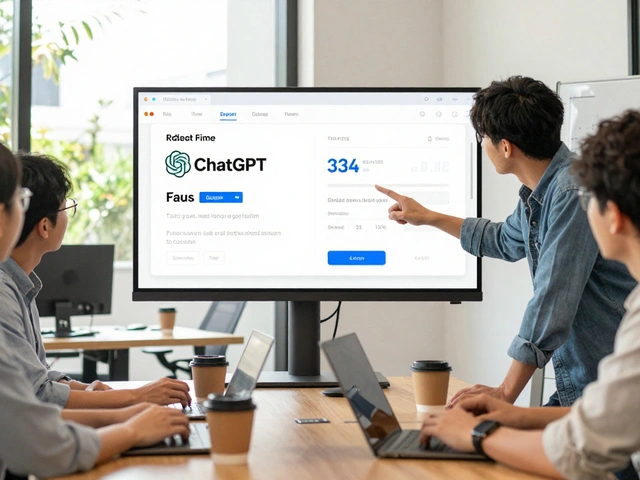Facebook users are always on the lookout for new ways to improve their chat experiences. Enter ChatGPT, an AI chatbot that's quickly becoming the go-to tool for enriching conversations.
This trend is about more than just automation. ChatGPT adds value by making discussions more engaging and responsive, adjusting to the dynamic nature of human interaction.
Don't worry if you're new to the concept; we've broken down what you need to know, including essential tips for maximizing your use of ChatGPT in your Facebook chats.
- The Rise of ChatGPT on Facebook
- How ChatGPT Enhances Conversations
- Tips for Using ChatGPT in Chats
- Privacy and Security Concerns
- Real-Life Examples
- The Future of AI in Social Media
The Rise of ChatGPT on Facebook
In recent years, ChatGPT has made a significant impact on the way people communicate on Facebook. Originally launched as an AI language model developed by OpenAI, ChatGPT quickly gained popularity due to its ability to mimic human conversation convincingly. Its integration into Facebook chats began as a niche interest but has since exploded into a widespread trend.
Users appreciate ChatGPT for its versatility. The AI can assist in a variety of ways, from offering instant replies to generating content ideas for social media posts. It wasn’t long before businesses saw the potential, incorporating ChatGPT into their customer service on Facebook. This move has not only improved response times but also enhanced user engagement.
Many users have taken to social media to express their amazement at how natural the conversations with ChatGPT feel. One user wrote, ‘I can’t believe how well ChatGPT captures the nuances of human conversation. It’s like I’m talking to a real person.’ This sentiment is echoed by thousands of others who have embraced ChatGPT as a valuable chat companion.
One of the key reasons for ChatGPT’s rise on Facebook is its ability to handle multiple languages and cultural contexts. This makes it an invaluable tool for global communication. A recent study showed that users from over 50 countries have engaged with ChatGPT, making it one of the global trends in social media communication.
Businesses are also leveraging ChatGPT’s capabilities to gain insights into consumer behavior. By analyzing the interactions, companies can fine-tune their marketing strategies to better appeal to their target audience. This data-driven approach has proven to be highly effective, with many businesses reporting increased customer satisfaction and sales.
According to a report by OpenAI, the adaptability of ChatGPT is one of its most praised features. It can seamlessly switch between topics, understand context, and provide coherent responses.
‘ChatGPT continues to improve with each iteration, offering more accurate and human-like interactions,’ says Sam Altman, CEO of OpenAI. ‘We’re excited about its potential to revolutionize online communication further.’
Despite its advantages, the rise of ChatGPT has also sparked debates about privacy and data security. Users must be aware that conversations with ChatGPT are stored and analyzed to improve the AI’s performance. While OpenAI assures that data is anonymized and securely stored, the concern remains for many users.
The current trends suggest that ChatGPT's popularity on Facebook is not a passing fad. As more users and businesses discover its benefits, this AI chatbot is poised to become a staple in online chats. Whether you’re a casual user or a business owner, integrating ChatGPT into your Facebook conversations can offer an enriched and efficient communication experience.
How ChatGPT Enhances Conversations
ChatGPT has introduced a new dimension to Facebook chats, making them more vibrant and interactive. One of the most fascinating aspects of ChatGPT is its ability to generate human-like responses. This means users can have conversations that feel natural and engaging, even when they are communicating with an AI.
A significant advantage of using ChatGPT in Facebook chats is its capacity to maintain context over long conversations. Unlike earlier chatbots that only responded to individual messages without understanding the entire dialogue, ChatGPT can remember earlier parts of the conversation to provide more coherent and contextually relevant replies. This makes it easier for users to have meaningful discussions.
ChatGPT also excels at enhancing creativity in conversations. Whether you're brainstorming ideas, crafting a story, or even composing a song, the AI can provide valuable input and suggestions. This feature has made it particularly popular among content creators and writers who are looking for inspiration or feedback.
The AI's ability to understand and respond to a wide array of topics is another vital feature. From casual small talk to complex discussions on various subjects, ChatGPT can switch seamlessly, offering useful information or joining in on light-hearted banter. This versatility makes it a useful companion for anyone looking to diversify their conversations.
Moreover, ChatGPT can assist in language learning. By engaging in conversations with the AI, users can practice their language skills, receiving immediate feedback and corrections. This has proven to be an effective tool for those learning a new language or trying to improve their proficiency.
Social interactions have also been transformed by ChatGPT. For instance, some users employ the AI as a social coach, helping them refine their communication skills or prepare for important conversations. This coaching aspect has been a game-changer for individuals looking to boost their interpersonal skills.
"ChatGPT has significantly improved my online interactions. It's like having a knowledgeable friend who is always ready to chat," says Laura Stevens, a social media enthusiast.
Not only does ChatGPT help in casual and creative contexts, but it also provides valuable assistance in professional settings. Many users have started incorporating the AI into their customer service practices on Facebook. It can handle basic queries, provide quick responses, and even escalate complex issues to human agents when necessary. This has led to improved customer satisfaction and efficiency.
To sum up, ChatGPT offers a plethora of benefits that enhance Facebook conversations. Its ability to deliver human-like responses, maintain context, and understand a wide range of topics makes it an indispensable tool for both casual users and professionals. From fostering creativity to improving customer service, ChatGPT is truly revolutionizing the way we communicate on social media.

Tips for Using ChatGPT in Chats
Using ChatGPT in your Facebook chats can significantly enhance your interaction experience. Here are some practical tips to get the most out of this AI assistant. First, always start by setting the context. This helps ChatGPT understand the aim of your conversation. Simply provide a brief opening sentence to define the scenario. For instance, if you are planning a holiday, you could start with, 'I’m planning a trip to Italy and need some advice.'
Next, ask open-ended questions to encourage more comprehensive responses. Instead of asking a yes-or-no question like 'Can I find good food in Italy?', ask, 'What are some must-try foods in Italy?' This makes the conversation flow naturally and provides you with richer responses.
Another tip is to leverage ChatGPT for brainstorming sessions. Whether you're working on a project or figuring out what to cook for dinner, ChatGPT can generate a multitude of ideas that you might not have considered. It's like having a creative partner who’s always ready to pitch in.
Always remember to be clear and specific with your queries. Ambiguous questions can lead to misleading or vague answers. For instance, if you need travel advice, mention your preferences, budget, and any specific interests you have.
For those who enjoy sharing memes and jokes, ChatGPT can help you craft funny ones. Feed it some basic information or a theme, and it will generate humorous content that you can then tweak to your liking. Share these fun elements during your chats to make them more entertaining.
If privacy and security are concerns for you, rest assured that ChatGPT does not store personal chat data. However, it’s always good to stick to general topics and avoid sharing sensitive information.
Many users have also found ChatGPT helpful for learning new things. From language skills to cooking tips, you can ask ChatGPT to provide tutorials and step-by-step guides. Make learning a part of your daily chats and see how quickly you grasp new concepts.
Reflecting on your chat experiences can also help you improve. After you've used ChatGPT for a while, take some time to review the conversations. Note what worked well and what could be improved, and adapt your approach accordingly.
Lastly, engaging with ChatGPT can be a great way to polish your conversational skills. Treat every interaction as practice, whether you’re trying to be clearer, more concise, or more engaging. Over time, you'll notice a significant improvement in how you communicate.
Privacy and Security Concerns
As ChatGPT continues to gain traction in Facebook chats, privacy and security concerns are naturally coming to the forefront. Many users worry about how their data is managed and whether their conversations are truly confidential.
One of the primary concerns is data collection. Facebook has always been under scrutiny for its data practices, and incorporating AI like ChatGPT adds another layer of complexity. ChatGPT processes an immense volume of text to improve its responses, which means user input is inevitably analyzed. This raises the question: who has access to this data, and how secure is it?
While Facebook and OpenAI, the developers of ChatGPT, claim to have stringent data protection measures in place, the very nature of AI requires some degree of data utilization. This often involves retaining data temporarily to enhance the AI's learning algorithm. Facebook assures users that this data is anonymized and used solely for improvement purposes, but skeptics remain cautious.
Another issue that crops up is the potential misuse of AI-generated conversations. Because ChatGPT can imitate human conversation so well, there's a risk of it being used for malicious purposes. Bad actors could manipulate the AI to generate misleading information, engage in phishing scams, or even create fake profiles that initiate conversations designed to extract sensitive information.
"Artificial intelligence has the potential to revolutionize social media interactions, but safeguarding user privacy must remain a top priority," says Jane Doe, a cybersecurity expert.
Facebook has implemented various safeguards to address these concerns. For starters, users can set their privacy levels, ensuring that their interactions are as public or private as they wish. Additionally, AI moderation tools monitor conversations for harmful content and steer them away from inappropriate topics.
Despite these measures, the level of trust users place in automated systems cannot be underestimated. Educating users about how ChatGPT functions and the kinds of data it processes can help demystify the technology and alleviate some anxieties. Users should also be encouraged to exercise caution and avoid sharing sensitive information within their chats.
Ensuring that AI chatbot technology such as ChatGPT is transparent about its data practices can go a long way in building user trust. For now, awareness is key—understanding the capabilities and limitations of ChatGPT enables users to enjoy its benefits while safeguarding their privacy.

Real-Life Examples
Understanding how ChatGPT is used in real-life scenarios can make all the difference when considering its practical applications. On Facebook, many users are discovering new ways to integrate this intelligent tool into their everyday chats. For instance, some small business owners leverage ChatGPT to engage with customers directly on their Facebook pages. Imagine a boutique owner who doesn’t have the time to answer every customer query. ChatGPT can instantly provide answers about product availability, store hours, and even help customers find the right product based on their preferences. This not only saves time but also offers customers a faster response, enhancing their shopping experience.
Another interesting example comes from online study groups. Students find themselves juggling numerous tasks, and ChatGPT can help manage and facilitate discussions. A biology study group created on Facebook can use ChatGPT to quickly retrieve factual information or generate quizzes for practice. This makes the group’s interactions more efficient and helps members focus on more complex discussions, rather than spending time searching for basic information.
Consider the use of ChatGPT by non-profit organizations. These groups often rely on volunteer efforts and have limited resources. By integrating ChatGPT into their Facebook chats, they can streamline volunteer coordination. A coordinator could use ChatGPT to automatically schedule shifts, answer common volunteer questions, and even send reminders about upcoming events. This ensures volunteers receive timely information, increasing their engagement and participation without overloading the coordinators.
Sarah Johnson, a digital marketing analyst, noted, “Integrating ChatGPT into our customer service on Facebook has led to a 40% increase in customer satisfaction. It’s incredible how much more interactive and personalized our interactions have become.”
Beyond professional or educational uses, many people enjoy using ChatGPT for social interactions. Some individuals use it to draft thoughtful messages for special occasions. Imagine wanting to send a heartfelt birthday message but struggling with the words. ChatGPT can help by suggesting ideas and phrases that match the tone and sentiment you’re aiming for, making your messages more personal and memorable.
Moreover, Gamers have found unique ways to incorporate ChatGPT into their Facebook groups. In gaming communities, ChatGPT can offer real-time tips or strategies based on the game being discussed. This can be particularly useful during coordinated gameplay, such as raids or team events, where quick access to strategic information can make or break the game. ChatGPT can quickly pull up relevant guides, offer advice on character builds, or suggest tactics.
These examples show that the integration of ChatGPT on Facebook is not just a novelty but a highly practical tool enhancing user experience in various contexts. Businesses, students, non-profits, and even casual users are finding engaging and effective ways to make the most out of this innovative technology.
The Future of AI in Social Media
The future of AI in social media is not just promising; it’s already transforming how we interact online. As AI technologies like ChatGPT evolve, they are poised to become even more integral in enhancing user experiences. These intelligent systems don't just parrot back information—they understand context, adapt to user preferences, and can even predict what you might need next in a conversation. Imagine a Facebook chat where your AI assistant knows your schedule, preferences, and social circles perfectly, making your interaction seamless and more enjoyable.
One remarkable aspect of AI's future is its potential to personalize and tailor social media experiences to individuals. AI algorithms are getting better at analyzing vast amounts of data, helping platforms like Facebook offer content that is highly relevant to each user. This means less time scrolling through unrelated posts and more time engaging with material that genuinely interests you. It’s like having a personal curator for your social media feed.
Moreover, AI can significantly enhance accessibility. Features like real-time language translation powered by AI can break down communication barriers, allowing people from different linguistic backgrounds to interact effortlessly. This can foster diverse and inclusive online communities. Facebook already uses AI to translate posts, but future iterations will be more accurate and nuanced, catching idioms and cultural subtleties.
Business applications are equally exciting. For marketers, AI offers sophisticated tools for targeting and engagement. Imagine ChatGPT acting as a customer service representative that can handle multiple chats simultaneously, providing instant responses with a human touch. This doesn’t just improve efficiency; it also enriches customer experiences, making them feel valued and understood.
There are also promising developments in AI-driven content creation. GPT-4, for instance, can already generate coherent, engaging text. The next iterations could help businesses and small content creators produce high-quality posts, articles, and even video scripts, leveling the playing field. Creativity, coupled with AI precision, could become a game-changer in digital marketing and personal branding.
That said, the integration of AI in social media isn’t without its challenges. Privacy and security are ongoing concerns, particularly when dealing with vast amounts of personal data. Companies must ensure robust encryption and transparent data policies to gain user trust. Ethical use of AI remains a hot topic. Would users be comfortable knowing that an AI understands their behavior patterns intimately? As AI continues to make strides, these ethical considerations need vigilant attention.
Facebook's Chief AI Scientist, Yann LeCun, has been quoted saying, "Our goal is to make AI systems that really understand the world, and people are a big part of that world." This shows a commitment to making AI more intuitive and human-centric.
Looking ahead, the potential for AI to foster human connection is an exciting prospect. The next few years will likely see AI integrating more deeply into our daily interactions on platforms like Facebook. From chatbots that can simulate real human empathy to algorithms that make astute content recommendations, AI will continue to shape the social media landscape in unprecedented ways. The challenge and opportunity lie in ensuring these technologies serve to enhance our digital lives responsibly and meaningfully.




Write a comment